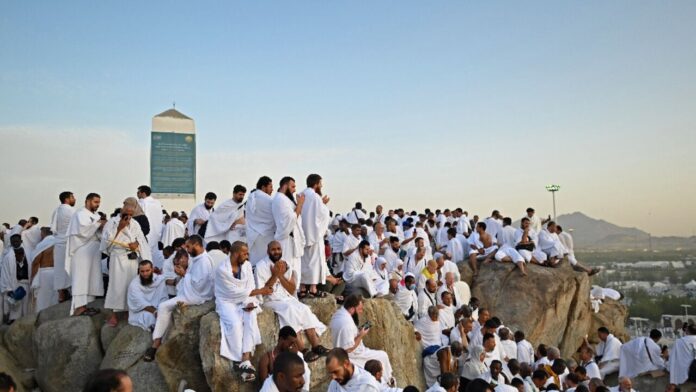MUSLIM pilgrims, on Thursday, June 5, prayed atop Mount Arafat during the high point of the yearly hajj pilgrimage, as Saudi officials called on participants to refrain from being outside during the hottest hours of the day.
Thousands of pilgrims began to gather before dawn around the hill and the surrounding plain where the Prophet Mohammed is believed to have given his last sermon.
While some arrived early to take advantage of the relatively cool morning then, carrying colourful umbrellas, many pilgrims remained for hours of prayers and Quran recitals until the evening in the most arduous portion of the hajj.
The pilgrims prayed at dawn on Saudi Arabia’s Mount Arafat, also known as Jabal al-Rahma or Mount of Mercy, during the climax of the Hajj pilgrimage.
After sunset, they headed to Muzdalifah, halfway between Arafat and the sprawling tent city of Mina, where they gathered pebbles to perform the symbolic ‘stoning of the devil.’
Hundreds of them, dressed in white, dotted the mount itself, with many more at its foot praying or taking pictures.
Saudi authorities had earlier in the week called on pilgrims to stay inside their tents between 10 am and 4 pm on Thursday when the desert sun is at its harshest.
Fans spraying mist and providing cool air were dispersed at the foot of the mount. Temperatures this year have already exceeded 40 degrees Celsius (104 Fahrenheit) as one of the world’s largest yearly religious gatherings, bringing together devotees from around the globe, kicked off.
To make this year’s pilgrimage safer, authorities have expanded infrastructure, deployed thousands of extra personnel and relied on an arsenal of high-tech tools to help better manage crowds.
They have mobilised over 40 government agencies and 250,000 officials, doubling their efforts against heat-related illness, following last year’s devastating heatwave.
Shaded areas have been expanded by 50,000 square metres (12 acres), with thousands more medics on standby and over 400 cooling units deployed, according to the Hajj minister.
A majority of the deaths last year were among unregistered pilgrims who lacked access to amenities, such as air-conditioned tents and buses; hence a cracked down on unregistered pilgrims looking to sneak into Mecca this year, relying on frequent raids, drone surveillance and a barrage of text alerts.
Hajj permits are allocated to countries on a quota basis and distributed to individuals by a lottery. But even for those who can obtain them, the steep costs prompt many to attempt the hajj without a permit, even at the risk of arrest and deportation, if caught.
Saudi Arabia earns billions of dollars yearly from the hajj, and the lesser pilgrimage, known as umrah, undertaken at other times of the year.

Published:


